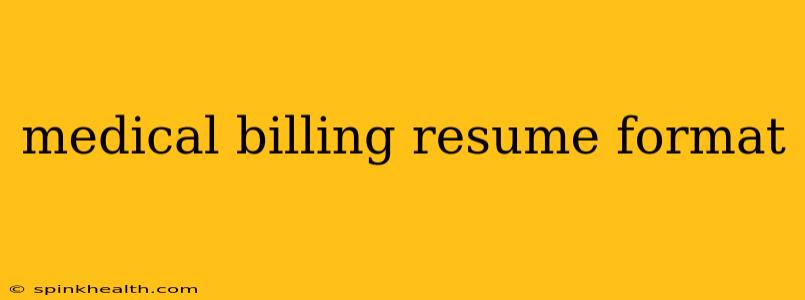Crafting a Winning Medical Billing Resume: A Story of Success
Landing your dream job in medical billing requires more than just experience; it needs a resume that tells a compelling story of your skills and achievements. This isn't just a list of tasks; it's a narrative showcasing how you've consistently improved efficiency, accuracy, and revenue cycle management within the healthcare industry. Let's craft a resume that captures the attention of hiring managers and lands you that interview.
Why a Story Matters: Imagine two resumes. One is a dry list of job duties. The other narrates how the candidate streamlined a billing process, resulting in a significant reduction in denied claims or an increase in timely payments. Which one would you find more engaging? The second one, undoubtedly. That's the power of storytelling in your resume.
The Structure: A Winning Narrative
Your resume should follow a clear and logical structure, guiding the reader through your career journey. Think of it as a well-structured story with a beginning, middle, and end – each section highlighting your contributions.
1. Contact Information: (The Opening Scene)
- Name: (Clearly visible and professional font)
- Phone Number: (Easily accessible and reliable)
- Email Address: (Professional and error-free)
- LinkedIn Profile URL: (Optional, but highly recommended)
2. Summary/Objective: (Setting the Stage)
This is your elevator pitch – a concise overview of your key skills and career goals. Tailor it to each job application.
- For experienced professionals: Highlight your achievements and quantifiable results. For example: "Highly skilled Medical Biller with 8+ years of experience in streamlining billing processes, resulting in a 15% reduction in denied claims and a 10% increase in timely payments."
- For entry-level candidates: Focus on transferable skills and enthusiasm. For example: "Highly motivated and detail-oriented recent graduate with a strong understanding of medical billing procedures and a proven ability to learn quickly."
3. Skills: (Introducing the Key Characters)
This section showcases your technical and soft skills crucial for medical billing. Categorize them for better readability.
- Software Proficiency: List specific billing software (e.g., Epic, Cerner, Medisoft, Practice Fusion), electronic health record (EHR) systems, and other relevant software.
- Technical Skills: Include coding (ICD-10, CPT, HCPCS), insurance claim processing, denial management, accounts receivable management, payment posting, and data entry skills.
- Soft Skills: Emphasize crucial skills like attention to detail, accuracy, problem-solving, communication (written and verbal), teamwork, and time management.
4. Experience: (The Main Plot)
This is the heart of your resume. For each role, use the STAR method (Situation, Task, Action, Result) to showcase your achievements. Quantify your accomplishments whenever possible using numbers and metrics.
- Job Title: (Clearly stated)
- Company Name: (With location)
- Dates of Employment: (Month/Year – Month/Year)
- Bullet Points: Focus on accomplishments rather than just responsibilities. For example, instead of "Processed insurance claims," write "Processed an average of 150 insurance claims per day with 99% accuracy, resulting in timely reimbursements and minimizing revenue cycle delays."
5. Education: (The Resolution)
- Degree: (Name of degree)
- Major: (If relevant)
- Institution: (Name of institution)
- Graduation Date: (Month/Year)
- Relevant coursework: (List courses related to medical billing or healthcare administration)
6. Certifications (Optional):
- List any relevant certifications, such as Certified Professional Coder (CPC) or Certified Billing and Coding Specialist (CBCS).
7. Volunteer Experience or Projects (Optional):
This can showcase your commitment to the field and highlight additional skills.
Addressing Frequently Asked Questions (PAAs): While PAAs aren't directly applicable to resume formatting, understanding the questions potential employers might have helps tailor your resume to address those concerns implicitly.
How do I format my resume for medical billing?
The format above directly addresses this. Use a clean, professional template, and ensure readability is paramount. A chronological format is often preferred for medical billing.
What are the essential skills for a medical billing resume?
The "Skills" section above details essential technical and soft skills. Remember to customize this based on the specific job description.
How can I highlight my achievements in a medical billing resume?
Use the STAR method to showcase accomplishments, quantifying results whenever possible with metrics and numbers.
How many pages should my medical billing resume be?
One page is generally sufficient for most medical billing positions, unless you have extensive experience requiring more space.
By following this structured approach and incorporating compelling narratives, your resume will stand out from the competition and increase your chances of landing that interview. Remember, it's not just about what you did, but the impact you made. Tell your story effectively, and the job will be yours.

